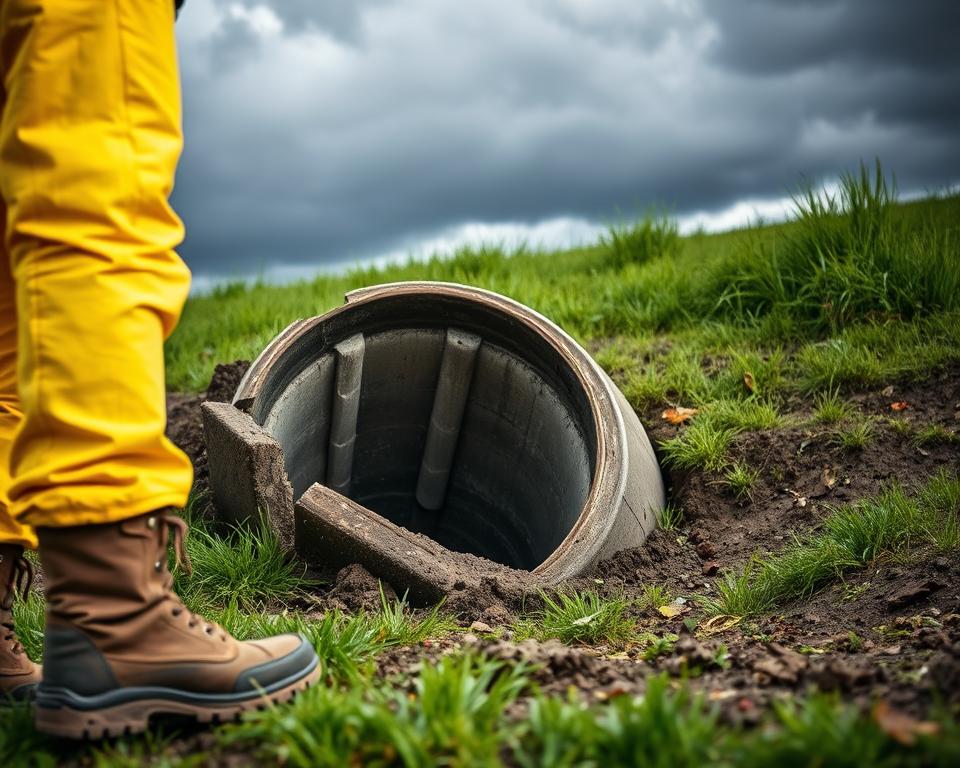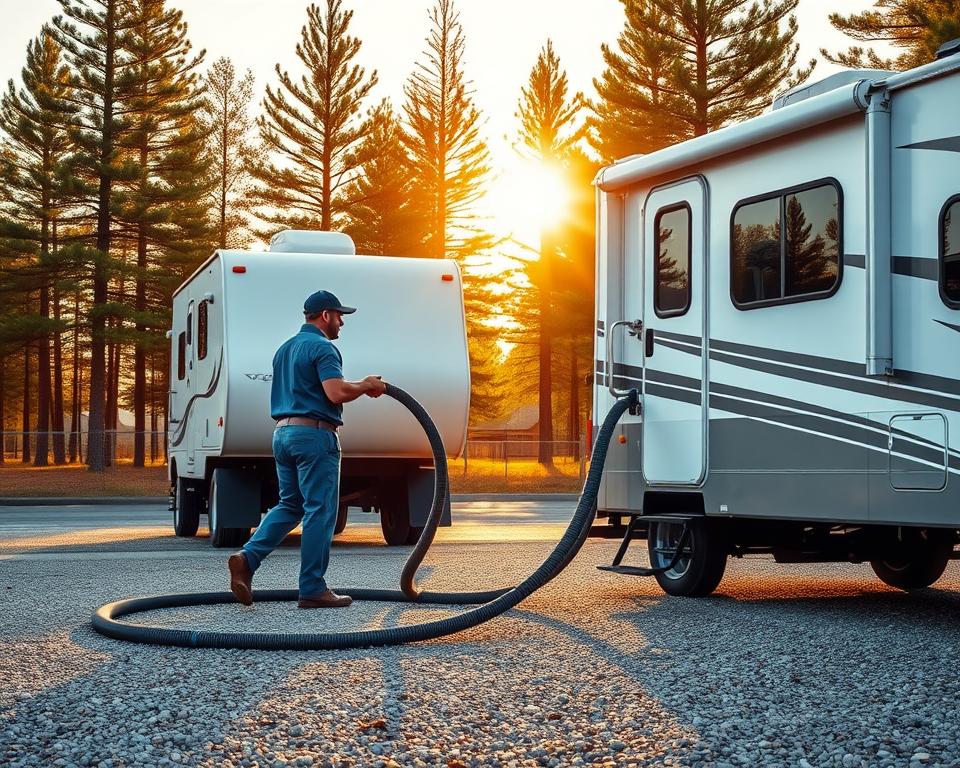Quality Assurance with Septic Tank Cleaning Services Near Me (Northridge)
Looking For Emergency Septic Service? Get Help Now! We Can Help!
Have you considered how a septic emergency could drastically impact your home? Understanding the crucial role of quick and dependable emergency septic service is crucial. All in Sanitation is your trusted ally in times of need. Our expert team is ready 24/7, ensuring immediate aid with septic tank pumping and emergency services.
You’re not alone in facing septic troubles. You can always get swift, dependable help just a call away with septic tank services in my area.
Notable Observations
- Crucial emergency septic service helps prevent major household issues.
- You can get 24/7 support for all your septic needs from All in Sanitation.
- Prompt septic tank pumping can avert costly damages.
- Peace of mind is ensured by professional emergency septic tank service.
- Act before it’s too late by learning the signs indicating a septic emergency.
- Choosing a reliable provider can save you time and stress.
Learning About The Value Of Emergency Septic Services
Emergency septic service is vital for community health and safety. Serious future issues are forestalled for homeowners with its help. Failing septic systems expose communities to dangerous waste, threatening health and property alike.
Quick fixes to septic issues avert expensive damages and possible environmental harm. Overlooking these problems only makes them worse, requiring broader repairs. Property owners must thus be alert to signs that demand emergency help.
Maintaining septic tanks is essential for system longevity. Frequent monitoring and care reduce the risk of major failures. Homes gain trustworthy wastewater management and avoid neglect’s consequences by using specialized septic services.
A healthy living space is safeguarded by allocating funds for emergency septic services. Homeowners can shield their properties and loved ones from septic system hazards with professional aid.

Signs That Indicate You Need Emergency Septic Service
Homeowners can prevent major problems by knowing the signs of a septic emergency. Slow drainage warns of deeper issues needing quick resolution. Sewage coming back up are a health hazard, signaling septic failure.
A faulty septic system is suggested by foul smells. These odors signal leaks or blockages. To avoid serious issues, it’s crucial to detect these smells early.
Pooling water indicates a full or failing septic tank. Immediate action is required by this condition to avoid further damage. Toilet flushing problems that are consistent point to a clog or septic issues.
Early recognition of these symptoms can ward off extensive damage and costly repair jobs. It is advised to get regular septic tank inspections to spot early warnings. The key to a well-functioning septic system is acting swiftly.
What Happens During Emergency Septic Service
Getting a handle on the procedure can ease your worries when you reach out for emergency septic service. A comprehensive assessment of your system is how the process begins. To understand your situation and figure out the next steps, a skilled technician will conduct an initial talk. They use sophisticated tools for assessing your system’s condition.
The technician will pinpoint the issues and lay them out for you. You’ll be briefed on the necessary fixes, which promotes transparency. This openness enables you to make well-informed choices regarding cleaning and fixing your septic tank. A clear breakdown of the involved costs will be provided, setting clear expectations.
Septic Tank Pumping – Vital Maintenance
Your septic system’s health vitally depends on routine pumping of your septic tank. Ignoring this critical service invites backups and expensive repairs. Preventing system failure is ensured as waste doesn’t reach dangerous levels.
It’s advisable to schedule septic tank pumping every 3-5 years, depending on household size and water usage. Extending your septic system’s life is a result of this maintenance. Preventing unforeseen issues and keeping the environment clean is the benefit of a dependable septic tank pumping service.
Preventative care yields substantial long-term savings. Neglecting maintenance costs significantly more than regular care. By being proactive, you safeguard your property and improve community health.
| Service | Frequency | Cost Estimate |
|---|---|---|
| Septic Tank Pumping | Every 3-5 years | $300 – $500 |
| Septic System Inspection | Every 1-3 years | $100 – $300 |
| Septic Tank Repairs | As Needed | Varies |
Focus on consistent septic tank pumping and professional maintenance for optimal system functioning over the years.
Complex Problem Handling: Septic System Repair
At All in Sanitation, we understand that repairing septic systems involves intricate problems. Prompt action is crucial when leaks or damaged pipes occur. Diagnosing and solving these issues effectively is something our experts are skilled at. Identifying the root cause of the trouble is done through detailed inspections.
Scenarios where emergency septic services are often needed include
- Severe leaks posing environmental risks.
- Pipes that are blocked or damaged, affecting drainage.
- Malfunctioning components like pumps or alarms, leading to system failure.
We are committed to efficient and safe septic system repair. Ensuring optimal system functionality is done as our team follows strict safety guidelines during repairs. Should you notice any septic system issues, reach out to us for dependable help.
Long-Term Health Through Septic Tank Maintenance
Your home’s well-being and operational efficiency depend crucially on a healthy septic system. The key to prolonging your system’s functionality is consistent maintenance. Including regular checks, pump-outs, and cleaning sessions, this maintenance covers various tasks. By doing so, homeowners can sidestep expensive fixes down the line.
Integrate these tasks into your routine for effective septic management:
- Annual inspections should be conducted to identify potential problems early.
- Depending on household size and usage, pump your septic tank every 3-5 years.
- Engage professional services for cleaning your septic tank to eliminate sludge accumulation.
Avoid flushing substances like grease, chemicals, and non-biodegradable products that harm your tank. Maintaining your system’s efficiency requires crucial proper wastewater disposal.
Promptly addressing issues such as slow draining or bad smells is crucial if you encounter them. Immediate action helps keep your septic system healthy. This proactive approach also protects your property and the environment.
Selecting the Right Emergency Septic Service Provider
Reliability and quality should be your primary focus when selecting an emergency septic service. For its dependable septic system repair solutions, All in Sanitation is renowned. Check the provider’s experience first; a well-established company will possess a proven track record handling various septic problems.
A lot of importance is placed on clear pricing. Look for companies that provide upfront estimates. This builds trust and prevents surprise charges. Ensure the service has the required certifications for septic inspections and repairs as well.
Customer reviews are invaluable tools for assessing potential services. Those praised for their emergency septic solutions are the ones to choose. Making a big difference, especially in urgent situations, is a team that is both responsive and knowledgeable.
Getting estimates from several companies can be enlightening. It helps you understand what services are available and the usual costs. The right emergency septic service provider is crucial for your septic system’s long-term health. A vital move for your home’s plumbing maintenance is this.
All in Sanitation: Our Comprehensive Septic Services
At All in Sanitation, we deliver a range of vital services for optimal septic system function. To prevent further issues, our emergency septic service swiftly addresses urgent problems. Immediate help is offered by our team whether you’re dealing with a backup or other malfunctions.
For your septic tank’s durability, pumping it periodically is essential. Tailored to your home’s needs, we advise getting this service every three to five years. Preventing system blockages and health hazards effectively is possible by our experts by doing this.
Maintaining your septic tank is key to our services. To avoid expensive issues later, we conduct detailed inspections, make minor repairs, and implement measures. Future costs and anxiety are significantly reduced by a consistently cared-for system.
| Service | Description | Frequency Recommended |
|---|---|---|
| Emergency Septic Service | Immediate response to sewage backups and system failures. | As needed |
| Septic Tank Pumping Service | Removal of sludge and scum to maintain tank capacity. | Every 3-5 years |
| Septic Tank Maintenance | Regular inspections and minor repairs to ensure system efficiency. | Annual |
By choosing All in Sanitation, you ensure your septic system’s efficiency. Investing in our trusted services now safeguards your septic health for the future.
Testimonials From Satisfied Customers
Leading our priorities at All in Sanitation is customer satisfaction. Our commitment shines through in each positive feedback, showcasing our excellence in emergency septic services. Our clients appreciate our swift response and expertise in handling septic challenges effectively.
Understanding Emergency Septic Service Costs
Informed decision-making is aided for homeowners by understanding the expenses linked to emergency septic service. The required service type, the timing of the request, and encountered complexities are notable factors among these costs.
Varying by tank size and local service rates are typical septic tank pumping costs. Cost fluctuations based on the tank’s fullness and ease of access may be noticed by homeowners. Steep costs tied to emergency interventions can be avoided by having regular maintenance.
Especially under intricate circumstances, the expense tied to costs for septic system repair can surge. Prices are heavily influenced by factors like the extent of the damage and the time needed for repairs. Acquiring a comprehensive quote beforehand is thus crucial for effective budgeting.
| Service Type | Cost Range | Notes |
|---|---|---|
| Emergency Septic Service | $200 – $500 | Pricing depends on the urgency and nature of the problem. |
| Septic Tank Pumping | $150 – $300 | Costs vary by tank size and local rates. |
| Septic System Repair | $500 – $1,500 | Complexity of repairs affects pricing. |
All in Sanitation keeps its rates fair while ensuring top-notch service. Clients are allowed to make choices with confidence thanks to their transparent pricing model. Recognizing these costs encourages better planning and regular septic system upkeep.
As a Final Point
Vital for homeowners is having access to dependable emergency septic services. To save time, effort, and funds, rapid intervention is necessary because septic issues can worsen quickly. Committed to swiftly addressing your needs and ensuring you’re never left handling septic troubles alone is All in Sanitation.
Ensuring your septic tank’s longevity requires maintaining it properly. Understanding warning signs allows homeowners to act swiftly. Through regular inspections and upkeep, you can prolong your system’s life and secure your peace of mind.
Remember that expert assistance is only a phone call away should issues arise. Staying ahead in your septic system’s upkeep ensures a seamless experience. To keep your home’s septic system in top condition confidently, lean on professional support.

